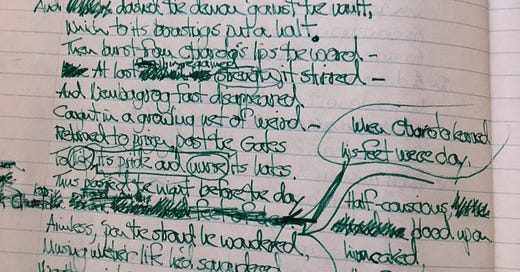Set in a medieval fantasy world as The Rowan Canticles is, to use modern language in it would be less than true to the work’s ethos, I thought when I began it, and so the syntax and vocabulary are old school. Some of that vocabulary is archaic, but other than a handful of portmanteau words I’ve created for species of fish and a vegetable, the rest of the words are legitimate, if somewhat underused lately. All can be found in one dictionary or another. The only rule I’ve followed throughout is that each line has eight syllables. Half the fun of versifying The Rowan Canticles was coupling strange words with even stranger ideas, back and forth, until, like a puzzle, the pieces in each line fit snugly together.
Three canticles, or long songs, make up the story. They are broken into shorter cantos that take the place of chapters. Each of the three canticles follows a different rhyme scheme. Canticle I is in couplets, Canticle II is in quatrains, and although Canticle III begins with 8-line whorls, it eventually moves to free verse for a series of cantos until, like a symphony returning to the tonic, it modulates back to couplets for the ending.
I’ve also embedded some end-rhyme games in Canticle III. Once we get there, I’ll challenge you to find them. Thanks for reading and listening!
!
—Odds Bodkin






I really love the opening “ stanzas” of your description of life…delicate things most sublime but fleeting. And the later your musing of life’s end.
I read a lot of Alfred, Lord Tennyson growing up so I find your “ doggerel” easier when I go back to some of his poetry !
I like this very much!!